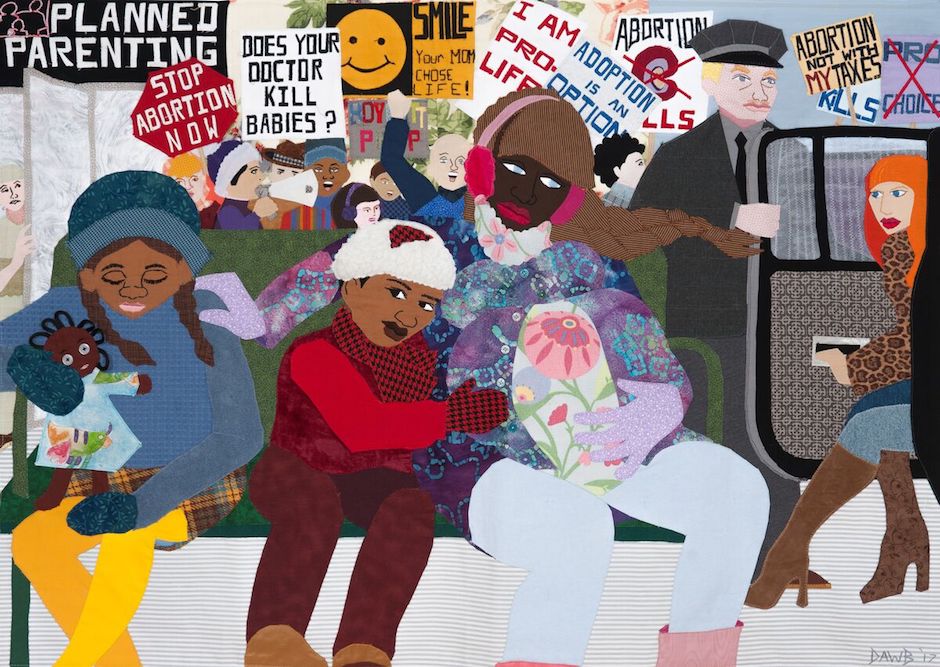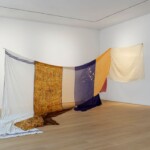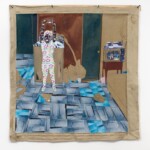Exhibition
in New York, NY / United States
- Dawn Williams Boyd: The Right to (My) Life, 2017, mixed media, 91.4 x 121.9 cm, 36 x 48 in, © Dawn Williams Boyd, Courtesy of Fort Gansevoort, New York, Photo Ron Witherspoon
- Eric N. Mack: Forward walking boy on the edge where the sand meets the shore (from DES HOMMES ET DES DIEUX), 2018, silk organza, cotton handkerchief and tulle, 257 x 470 x 303 cm, 101 1/8 x 185 1/8 x 119 1/4 in, © Eric N. Mack, Courtesy of the artist and Simon Lee Gallery, Photo Prudence Cuming Associates
- Genesis Jerez: Blue Ballerina, 2021, Charcoal, paper, and oil on linen, 203.2 x 199.4 cm, 80 x 78 1/2 in, © Genesis Jerez, Courtesy the artist, Photo Jason Mandella
- Qualeasha Wood: Ctrl+Alt+Del, 2021, cotton Jacquard weave, glass beads 213.4 x 157.5 x 1.3 cm, 84 x 62 x 1/2 in, © Qualeasha Wood, Courtesy the artist and Gallery Kendra Jayne Patrick, Photo Qualeasha Wood
Curated by Legacy Russell, Executive Director & Chief Curator of The Kitchen, ‘The New Bend’ brings together 12 contemporary artists working in the raced, classed, and gendered traditions of quilting and textile practice – Anthony Akinbola, Eddie R. Aparicio, Dawn Williams Boyd, Diedrick Brackens, Tuesday Smillie, Tomashi Jackson, Genesis Jerez, Basil Kincaid, Eric N. Mack, Sojourner Truth Parsons, Qualeasha Wood, and Zadie Xa. Their unique visual vernacular exists in tender dialogue with, and in homage to, the contributions of the Gee’s Bend Alabama quilters – Black American women in collective cooperation and creative economic production – and their enduring legacy as a radical meeting place, a prompt, and as intergenerational inspiration. This exhibition acknowledges the work of Gee’s Bend quilters such as Sarah Benning (b. 1933), Missouri Pettway (1902-1981), Lizzie Major (1922-2011), Sally Bennett Jones (1944-1988), Mary Lee Bendolph (b.1935), and so many more, as central to expanded histories of abstraction and modernism.
While the account of Modern Art engages abstraction as a critical tool of experimentation, the narrative as it has been told to-date has not been inclusive of this group and the ways in which they continue to transform art history, visual culture, and cultural production across localities and generations. Intersecting with the 20th anniversary of the groundbreaking exhibition ‘The Quilts at Gee’s Bend’ first presented at The Whitney Museum of Art (2002-2003), each of the artists featured in ‘The New Bend’ explores this legacy both in their technical approach and formal aesthetic. The abstract and expressive modes of cutting, stitching, splicing, and remixing articulated in this exhibition as queered performative and editorial acts also reframe an understanding of the digital, computational, memetic, and algorithmic. Audrey Bennett, University of Michigan Professor of Art and Design, coined the term ‘heritage algorithms’ in 2016 to denote the goal of ‘not reducing culture to code, but expanding coding to embrace culture.’ In their co-authored essay ‘On Cultural Cyborgs’ (2020), Bennett and her collaborator Ron Eglash, Professor of Information, call to ‘decolonize cybernetics’ as a core component of ethnocomputing. What the quilters of Gee’s Bend reveal via their transformative cooperative work is that they are both artists and technologists, contributing simultaneously to art history, as well as to science, technology, engineering, and mathematics (STEM) practice. This duality exists in the work of each artist featured in this exhibition and many more beyond who continue to grow in this tradition. Thus, through their practice, the 12 artists on view in ‘The New Bend’ propose electrifying new directions, adding a promising new bend in this journey.
About Gee’s Bend
The town of Boykin – also known as Gee’s Bend – is an intimate African American community located at the arc of a bend of the Alabama River within Wilcox County, Alabama in the United States. The location was originally named for a landowner and slaveholder of the same surname who in 1816 settled in the area and built a cotton plantation. Many of the residents of the area are descendants of the enslaved people who worked on this plantation; they therefore carry shared family names, such as Bendolph, Pettway, and Young. The formation of the quilting tradition of Gee’s Bend rises out of the 19th and 20th century and carries on to present day where a vibrant network of collective quilters continues to grow and apply their creative practice. In the 1940s, the land of Boykin was sold in plots by the United States government to local families still living in the Bend. In a complex twist, this made it possible for the Black and Native residents of the area – once subject to the extractive labor and economic practices of enslavement and sharecropping – to gain ownership in part over the same land their families had once forcibly worked within.
The quilts were originally produced for functional purposes and family use. Over time cooperatives such as The Freedom Quilting Bee (established in 1966 in Rehoboth, Alabama and remaining in operation until 2012) and the Gee’s Bend Quilters Collective (established in 2003) were impactful in shaping an alternative economic model that allowed for the quilters to raise funds for their community. The Freedom Quilting Bee also played a key role in political consciousness-raising, active participants in the drives for voting rights and advocates within the civil rights march from Selma to Montgomery. Over time, a dynamic dialogue surrounding their work has expanded to international acclaim and enduring critical resonance.
Learn more about this history and support Gee’s Bend quilters by visiting www.soulsgrowndeep.org.
Gallery hours Tue–Sat 10 am – 6 pm
In accordance with local guidelines and to ensure the health and safety of all our guests and staff, masks are required inside the exhibition, as well as proof of COVID-19 vaccination.
For further information please refer to current local guidelines provided by New York City as well as the CDC website.
Location:
Hauser & Wirth New York
548 West 22nd Street
10011 New York, NY
United States





